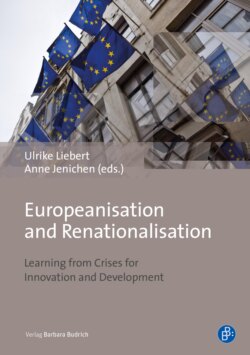Читать книгу Europeanisation and Renationalisation - Группа авторов - Страница 13
На сайте Литреса книга снята с продажи.
[33] Conclusions
ОглавлениеOur analysis of trends in public opinion, in party stances and party competition on issues of European integration makes amply clear that the room of manoeuvre for the French president and the French government has shrunk over the past years. France provides a clear example of a trend from a ‘permissive consensus’ to what Lisbeth Hooghe and Gary Marks called a ‘constraining dissensus’ on Europe (Hooghe/Marks 2009). When designing its European policy, the French executive has to look more than ever to its societal and political support base. This change can be referred to as a kind of ‘domestication’ of French European policy, where domestic political considerations gain always more importance (Schild 2008).
At the level of political parties, two conclusions are in order. Firstly, fringe or challenger parties do not use European integration issues only to distinguish themselves tactically from their mainstream competitors. On the contrary, European issues or the Europeanisation of national policies moved towards centre stage in their discourses. This makes Europe much more salient in public debates which thereby become always more polarised. Secondly, a process of clarification among mainstream parties might be underway. As the presidential campaign in 2017 made clear, they can no longer play down European issues in an attempt not to stir up their internal divisions as their challengers attack them precisely on this issue dimension.
So far, the French case has provided evidence for a positive correlation between the level of politicisation – in terms of polarisation and salience of European issues – on the one hand and the spread of Eurosceptic attitudes among mass publics and political parties on the other hand. Front National (renamed ‘Rassemblement National’ in 2018) gives European issues the highest public visibility and, at the same time, it is the most Eurosceptical among all major parties. Moreover, it has gained a lot of electoral ground since the start of the European ‘polycrisis’.
What can we then learn from the French experience? Our tentative conclusion is that the idea to pursue a strategy of politicisation of European issues in order to strengthen the European Union’s legitimacy is based on a questionable empirical assumption, namely that higher degrees of politicisation might lead to higher support for European integration.
Political actors with a strong strategic interest in politicising European issues can be found mainly among Eurosceptic challenger parties and also in the Eurosceptic wings of mainstream parties. The more institutionalised opportunities these actors find to publicly express their Euroscepticism – making use of referenda and primaries for candidate selection – the better are the conditions for them to succeed.
[34] It remains to be seen in how far counter strategies to confront Eurosceptics and globalisation sceptics head on, such as developed by Emmanuel Macron, remain successful both in winning elections and in fighting the rampant Euroscepticism in French society. Ultimately, this could lead to a restructuring of the party system as the European cleavage might further gain importance for inter-party competition.
